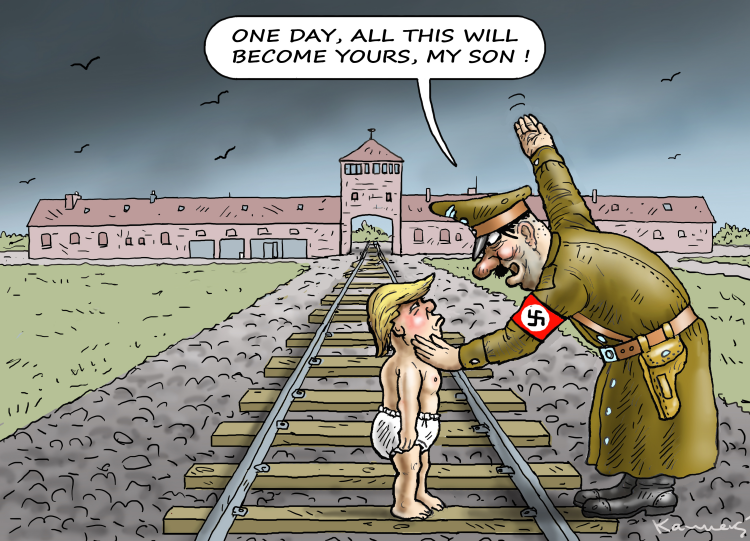
The White House 's troubling statement for International Holocaust Day flirts with "softcore" Holocaust denialism.
Statement by the President on International Holocaust Remembrance Day
“It is with a heavy heart and somber mind that we remember and honor the victims, survivors, heroes of the Holocaust. It is impossible to fully fathom the depravity and horror inflicted on innocent people by Nazi terror.
“Yet, we know that in the darkest hours of humanity, light shines the brightest. As we remember those who died, we are deeply grateful to those who risked their lives to save the innocent.
“In the name of the perished, I pledge to do everything in my power throughout my Presidency, and my life, to ensure that the forces of evil never again defeat the powers of good. Together, we will make love and tolerance prevalent throughout the world.”
President Donald Trump has barely been in office for a week and already he’s being accused, by prominent and credible people, of aiding and abetting Holocaust denial. Both Sen. Tim Kaine, D-Va., and conservative commentator John Podhoretz have gone public with such criticisms.
This outcry resulted from the White House statement on Holocaust Remembrance Day, which omitted any mention that the Holocaust was an effort to get rid of the Jewish population of Europe. All previous presidents had made mention of the fact that while many non-Jewish people were killed in Nazi Germany’s concentration camps, the machinery of the Holocaust was created and effectively used to kill more than 60 percent of Europe’s Jewish population.
This omission is especially troubling in light of the fact that Holocaust denialism — which is about either outright denying or aggressively downplaying the Jewish genocide at the hands of the Nazis — is a common feature of the specific variety of white nationalism that is being mainstreamed through Trump and his “alt-right” advisers, including former Breitbart head Steve Bannon. The fact that Trump’s Holocaust statement was issued at almost the same time as his ban on refugees and immigrants from certain countries, which reminded many of the efforts to turn away Jewish refugees during World War II, did not help matters.
In addition, Trump is known to be fond of conspiracy theories, including overtly racist ones like the “birtherism” he used to plague Barack Obama. Holocaust denial is the granddaddy of conspiracy theories, and many of the common tropes and strategies used by a wide range of conspiracy-mongers can be traced back to efforts to deny or explain away the Nazi campaign to murder Jews.
“The fact of the matter is that the Holocaust, as defined by historians, is not ‘all the bad things the Nazis did,'” explained historian Deborah Lipstadt over the phone. “The Nazis did lots and lots of bad things. But the Holocaust is the attempt to annihilate European Jewry.”
In 1993, Lipstadt wrote an important expose on Holocaust denialism, titled “Denying the Holocaust: The Growing Assault on Truth and Memory.” She was then sued in a British court by conspiracy theorist David Irving, because she correctly characterized many of Irving’s public statements as Holocaust denial. Lipstadt won the suit.
That famous court case was recently depicted in the feature film “Denial,” released last fall, in which Rachel Weisz plays Lipstadt.
In our conversation, Lipstadt laid out her theory that there are two kinds of Holocaust denial: “hardcore” and “softcore.”
“Hardcore denial,” she explained, is when someone seeks to deny the very existence of Nazi gas chambers, “deny Hitler wanted to kill the Jews [and] deny the facts of the Holocaust.”
Softcore denial, however, is subtler. That is less a matter of “denying the Holocaust outright” so much as “de-Judaizing it” or otherwise trying to downplay the historical importance of Hitler’s efforts to commit genocide against the Jews.
As Mark Hoofnagle of Denialism Blog, which tracks and exposes conspiracy theories, explained, softcore denialism has developed as a way for denialists to communicate their ideas while maintaining a veneer of plausible deniability.
Such softcore “deniers have become more subtle in the decades since Paul Rassinier outright denied [the Holocaust’s] existence in the aftermath of WWII,” Hoofnagle writes. They often rely instead on “minimization and distraction” to push the notion that while the Holocaust was a tragic event, it was not a large-scale genocide against the Jewish people.
This form of denial is similar, in this limited sense, to climate-change denialism. In some circumstances, denialists will flat out suggest that climate change is a hoax. In more mainstream arenas, they will soften their rhetoric, claiming instead to be unsure whether climate change is real, or admitting that it’s happening while expressing skepticism that humans are causing it.
It is worth noting that Trump himself has this habit, sometimes calling climate change a hoax and sometimes softening his rhetoric to suggest he’s just uncertain about the science. Is the analogy the same for the Holocaust, #OyVeyDonaldTrump ? #AmericaHangsItsHeadinShame.
No comments:
Post a Comment